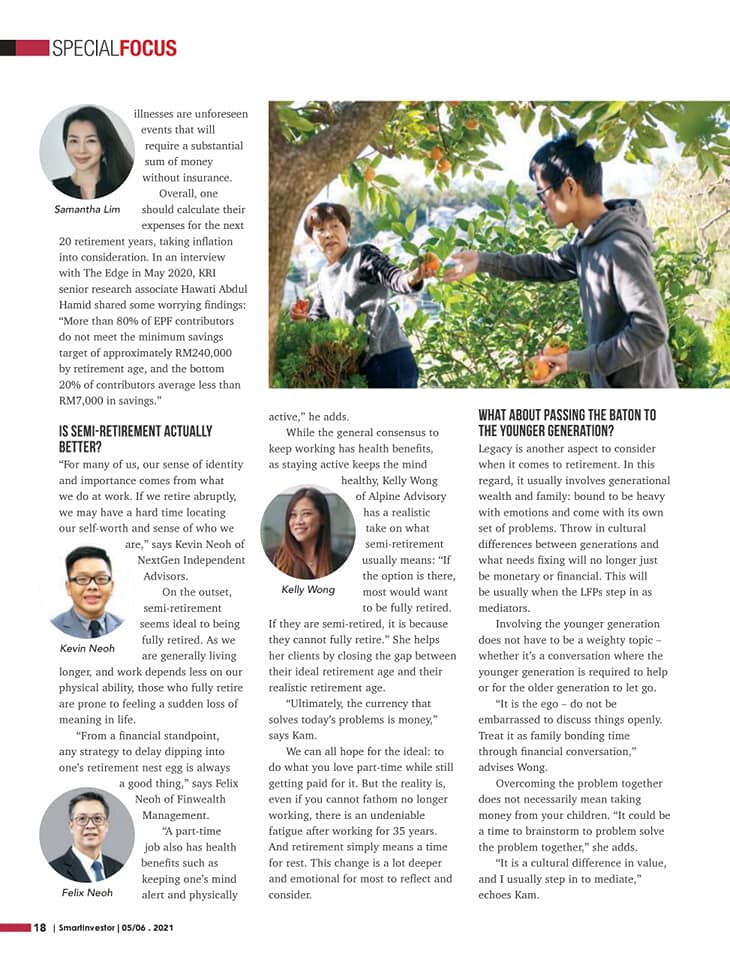
My Interview: Smart Investor – May/June 2021 | Issue 367 – Retirement Planning
1. What is the number 1 advice you would give all your clients of retirement age (aka baby boomers)?
Retirement is the dream many worked for but this dream could be shattered for some groups of people. And we have been hearing about people pushing off retirement as they don’t have enough saved for retirement – they spend their lifetime working hard for the family and children’s education, they end up with little savings and put their bet (retirement plan) on next generation. Based on average mortality age, one should calculate their expenses for the next 20-30 retirement years with taking inflation into consideration, and if we translate that into ringgit term, it means you should have a nest egg of approximately RM1 million. In an interview with The Edge (May 2020), KRI senior research associate Hawati Abdul Hamid noted some worrying findings. “More than 80% of EPF contributors do not meet the minimum savings target of around RM240,000 by retirement age, and the bottom 20% of contributors average less than RM7,000 in savings.”
My number 1 advice is – maintain a healthy lifestyle – healthcare could be very taxing and cost a fortune. And next, write your will or set up a trust.
Among the baby boomers that I have met, some have no idea about financial planning and many do not have life insurance / healthcare insurance. This could be a major concern for most of them as we all know that medical cost has been on an upward spiral for a long time with an estimated medical inflation of 10-15% annually – which means treatment cost will only escalate over the years. As citizens, we certainly can seek medical treatment at a local general hospital which medical cost is hugely subsidized by the government. However, for certain circumstances, people still opt to seek treatments from private hospitals due to urgency or other reasons.
Accidents, injuries, chronic illness are examples of unforseen events which requires us to fork out a substantial sum of money. As we aged, health issues can be more and more common that need to be taken care.
When researchers compared the men with exceptional longevity to their less fortunate peers, they identified five simple risk factors associated with a shorter life span. Three of these factors (smoking, lack of exercise and obesity) can be corrected or modified by lifestyle changes, while the other two (high blood pressure and diabetes) can be prevented or modified by lifestyle changes, medical management, or both. Many are beginning to recognize that taking a measure to prevent disease is much less expensive than treating it once it has occurred. To a greater extent, preventing disease is aided by living a healthy lifestyle whilst breaking unhealthy habit requires behavior change.
Will Writing – Insurance & EPF nomination is important to you, why not your estate?
[if !supportLineBreakNewLine]
[endif]
There are many reasons why people tend to put off making a will, often because they are reluctant to face the morbid subject of their mortality. Base on statistic, only two million people, or about 28% of the total seven million people that make up the working population in Malaysia, have a will, according to MWD Wills Depository Sdn Bhd. (Source: https://www.thestar.com.my/business/business-news/2019/06/18/only-28-of-malaysian-workers-have-a-will).
With a proper will done, you can articulate all your wishes, which can run the gamut from what you wish to give to each of your loved ones, and whether they are to benefit from the gift immediately or over a period of time.
You can express the apportionment of your assets to each of them, whether as a measure or endorsement of your love for each of them or a reflection of your intention to cater for their special needs or nurture their nascent talents. Other benefits of having a will including but not limit to:
- You can be clear about who gets your assets. You can decide who gets what and how much.
- You can keep your assets out of the hands of people you don’t want to have them (like an estranged relative).
- You can set monthly maintenance allowance for your disabled/special needs children or aged spouse who are not capable/no longer fit to handle their financials – by setting up a trust. You can also set condition such as to leave the house unsold until passing of spouse/disabled children.
- Your heirs will have a faster and easier time getting access to your assets.
- Transfer of immovable assets (real property, land) to beneficiaries by way of will and paying only RM10 stamping for each properties, saving thousands on stamp duty as compare to not having a will.
- Declaration of Trust to handover businesses in the safest and fastest way. Imagine when you are not around and creditors start to demand for payment. On the other hand banks will have concern if the key shareholder / keyperson with no proper succession planning might affect the business operation and growth – may eventually want to review their existing lending to the business. All this may be a disaster to business cashflow if credit facilities were to clawback or reduce if business risk is expose to this.
What Happened if I die without a will?
[if !supportLists]· [endif]Your assets will be distributed according to the formulas set out in the Distribution Act 1958, and not according to your wishes or the needs of your family members;
[if !supportLists]· [endif]The court will appoint a trustee and executor to administer your estate, and this may give rise to disputes between family members or beneficiaries on who should be appointed;
[if !supportLists]· [endif]The distribution process will take longer and cost more, ordinarily requiring a bond and the appointment of 2 sureties to guarantee the proper administration of the estate, as well as further court orders to effect the transfer of real property.
2. In your opinion, in this current economic climate and cultural trends, do you think semi-retirement is a more viable option than full retirement?
For many people, being semi-retired is preferable to being fully retired. Reasons vary from just wanting to remain busy to oft-cited need for supplemental income. Some of them may experience anxiety after retirement. After decades of working, the stark difference may trigger a sudden loss of meaning in life. Semi-retirement could be more rewarding, fulfilling and gives them sense of security as they continue to receive their wages/income.
Personally, I would like to stay social and active after my retirement, connecting with friends and family. I would think that semi-retirement is my ideal kind of retirement lifestyle. I would love to continue sharing my knowledge with people, and help as many people as I can. Many Malaysian still taking a passive stance on retirement and underestimating their financial needs. Factors such as inflations and life event could deplete one’s hard earn savings faster than we may expected. It is our role as financial consultant to create awareness for the public. As a Licensed Financial Planner, we want to go above and beyond the call of duty in anything that I could do. I aspire to add value to my profession with a passion beyond rudimentary salesmanship and it is my commitment to promoting financial literacy in the community and the people around me.
3. From your own perspective and client base:
– How many of them are already retirees?
From my existing clients base, only 25% are retirees. However I do provide free advice for the retirees whenever they need to understand product features that suite them, as financial products could look complicated and difficult to understand.
[if !supportLineBreakNewLine]
[endif]
– How many of them are of retirement age and would like to retire but have been finding it difficult to?
Most of them are semi-retirees. Some remain active in investing activities such as stocks, mutual funds or bonds. Some have become consultant in their own line of work or started their own ventures, mostly associated with their past experience and hobbies.
– What would you recommend for them to do?
Share basic concept of cashflow planning and cut unnecessary expenses. Live a simple life. As each individual’s situations varies, I will advise according to their situations and needs.
Planning our retirement budget can improve our peace of mind and lessen our stress about money in the golden years. Plus, calculating our budget will help us avoid spending too much of our nest egg too soon—a financial mistake many retirees make. You have the most control over one critical factor: your spending. Once we’ve retired, it may be tempting to see that sizable nest egg we’ve saved as a good excuse to start checking items off our bucket list. But over-spending can be financially dangerous; we’ve got to make our savings last, likely for decades.
We may find we’re willing to make certain trade-offs to retire earlier, travel more, or spend more on fun and hobbies. A good, detailed budget helps us live within our means, enjoy our life, and make our savings last as long as possible.
4. Our article will feature one professional who is of retirement age but is currently too dedicated to their job – what advice would you give to these clients where money is not a motivating factor for them to keep working, but it’s also something they still consider?
Working into retirement or opting for semi-retirement can be great for longevity and quality of life, not only because it helps a person to maintain their mental faculties, but it also generally increases one’s social interaction, which can be a large factor in quality-of-life assessments, especially for single seniors. The culture is changing, more people want to stay active, may not necessary for money but to continue contributing to the society. A semi-retirement could be the best of both worlds.
5. Our article will also feature one professional who is of retirement age but is still saddled with some debt and the dedication to keep providing for generational wealth to pass on to their children (even though they are already working adults) – where would you begin with setting them onto the path to full retirement?
Many Malaysians might be happy to save just enough money to pay for their retirement and leave something for their children. On the other hand, there are very dedicated parents who want their money to last longer than one generation. They intent to have businesses that their grandchildren can continue running or they have accumulated enough wealth that, if managed properly, could provide good lifestyle for their future generations.
In my past working experience, I saw a handful of high-level professional who are brilliant, achievement-oriented and accomplished, but at the same time exhausted, depleted, depressed and demoralized. In pursuing of a great career, they have compromised their health and well-being. Sacrificing health and well-being demonstrates one lack of prioritizing himself as important, failing to understand that one must put himself first — before he can be of true service to someone else like his organization, family or his employer. If our body is shutting down, diseased or broken down from the way you work, we will be end up nowhere.
There is an oft-quoted saying that full of social wisdom: “Give a man a fish, and he will be hungry again tomorrow; teach him to catch the fish, and he will be richer all his life.” It is more beneficial in the long run to teach a person how to do something than to do that something for them.
Legacy is defined as: A gift or a bequest, that is handed down, endowed or conveyed from one person to another. It is something descendible one comes into possession of that is transmitted, inherited or received from a predecessor.
I would say that one should prioritize on his own health and retirement planning, because the children will have the ability to take care of themselves. Our children may very well be our highest priority, the center of our universe, and perhaps we feel that everything we do is for them, however they are not our legacy. The greatest gift we can ever give them is a blueprint for their own success. This blueprint is our legacy plan, and incorporating the knowledge, values, etc., that create our life and success.
6. How could baby boomers have planned their retirement better? Or what can they do now, going forward?
Is there more you can do to help yourself have a better retirement? Understanding your expected spending patterns and ensuring you have an appropriate investment and drawdown strategy can help you determine whether you can support your desired retirement lifestyle.
The first thing I would said is to stay invested – select the right investment vehicles which match our financial goal. The lumpiness of healthcare expenditures means we need liquid financial assets which can be sold to meet these lumpy expenditures anytime.
Diversity is a key consideration for asset mix in the investments. Suggest clients to put money in a diversified portfolio that crosses different geographical and industry sectors. Dividend stocks is one of the ideal ways to preserve the capital while receiving constant dividends. Mutual fund may sound like a better tool if the investors are not well versed in equity market and require advice and recommendation from consultants, as well as to rely on the skills and expertise of fund manager. Risk appetite for different individuals may vary and hence it is important to talk to your financial consultant to perform risk assessment before investing. Retirees should avoid going into high risk products which may ends up eroded your capital.
There is generally a clear relationship between your desired level of spending, how much your savings are and the way in which the retirement savings are invested. This is referred to as a drawdown strategy.
In essence, a good drawdown strategy may require you to balance the following objectives:
- Sustain a stable and comfortable standard of living in retirement. Ideally similar to what you were accustomed to prior to retirement
- Protect the value of your savings against being eroded by inflation and adverse market conditions
- Provide you with access to your savings to pay for unplanned expenses (without significant penalties for early withdrawal of your capital), and
- Minimise the risk that you will outlive your wealth, at least for essentials.
And remember as we get older, it generally becomes harder to solve new problems and process new concepts meaning we often find we shy away from complex decision making. Therefore, it’s important to develop a drawdown strategy early that works for you, which accounts for this cognitive decline and that lets you easily change your investments as your needs change during retirement.
Important: The information and opinions in this article are for general information purposes only. They should not be relied on as professional financial advice. Readers should seek independent financial advice that is customised to their specific financial objectives, situations & needs.

Published By:
Samantha Lim 林淑燕
🌿 Plan With Purpose. Live With Peace. Leave a Legacy That Matters.
Wealth Strategist | Will & Trust Specialist | Passive Income Architect
After 20+ years in the financial industry, I’ve come to believe that true wealth is about more than just numbers. It’s about freedom, preparation, and peace of mind — not just for yourself, but for your loved ones too.
I help professionals, families, and business owners create sustainable passive income for the years ahead — while also ensuring that everything they’ve built is well protected and wisely passed on through strategic Will & Trust planning.
💼 What I Help You Do:
🔹 Build income streams that support your lifestyle — even in uncertain times
🔹 Create retirement readiness that’s steady, tax-smart, and stress-free
🔹 Craft Wills & Trusts that reflect your values and protect your wishes
🔹 Prevent family conflicts and probate delays with clear instructions
🔹 Design legacy plans that align with your heart, not just your assets
Whether you’re planning for rainy days, retirement, or the next generation — I’ll help you structure it with clarity and care.
🧩 My Expertise in Action:
✅ Helped a couple in their 50s restructure their finances to generate monthly passive income, preparing for early retirement without relying solely on their children.
✅ Guided a blended family through Will and Trust planning to ensure fair and conflict-free distribution across children from previous marriages — while preserving harmony.
✅ Advised a business owner on how to convert illiquid business assets into retirement income, while also drafting a succession plan that protects both the company and the family.
✅ Worked with aging parents to set up a Trust that includes emergency medical directives and clear instructions for caregiving decisions, easing future stress for the next generation.
✅ Assisted a working professional in setting up a private Trust fund for her nieces and nephews, aligning her wealth with her personal values even though she has no children of her own.
🌱 My Philosophy:
You’ve worked hard to grow your wealth.
Let’s make sure it supports your present, secures your future, and stands strong for those you love.
No pressure. No jargon. Just honest conversations, smart strategies, and a commitment to helping you:
🔹 Protect what matters most
🔹 Grow income without overexposure
🔹 Plan for life and legacy — with intention
Click HERE to schedule an appointment with me today!
🌿 未雨绸缪,是给自己最好的礼物和对家人最深的爱
被动收入设计|退休规划|遗嘱与信托策略师
二十多年来,我陪伴无数家庭穿越人生不同阶段:从财富积累、退休准备,到资产传承。过程中我深刻感受到,最安心的财富规划,往往不是为了自己,而是为了“不留遗憾”给至亲之人。
我们忙碌一生,辛苦打拼,但若没有一份清晰的安排与传承机制,一场突如其来的疾病、一张未更新的遗嘱,可能就足以撕裂一个家庭。
而我,就是那个在这些关键时刻,默默协助您思考最深层次问题的人——如果有一天您无法亲口表达,您的财富、信任与爱,要如何被完整传达?
💼 我的服务重点:
🔹 规划多元被动收入,让退休不靠孩子、不靠运气
🔹 策划**“活着”与“离开后”都适用的资产分配策略**
🔹 以家庭关系为核心,设立信托/遗嘱结构防止冲突
🔹 结合医疗、照护、失能等状况,提前做好应变准备
🔹 为企业主设计企业与家庭双轨传承路径
我不会只谈数字,我会陪您从内心出发,整理人生真正重要的事,并把这些通过法律与财务工具稳稳落实。
💡 客户真实故事(化名处理):
✅ 黄女士的孩子都在海外,为避免“回不来”或“找不到文件”的情况,我们设立了远程执行信托机制,确保即使突发事故,孩子能第一时间接手安排。
✅ 林先生退休前夕,担心养老金不足。我协助他重组资产,导入稳定现金流的投资机制,让他真正敢说:“我可以退休了”。
✅ 陈太太因父亲过世时留下模糊的遗嘱,亲人争产分裂。她决心为下一代留下一份清楚无争的安排,于是我们一起订下了信托结构+家庭备忘信,留下的不只是钱,还有祝福与指引。
✅ 一位单身客户说:“我没孩子,但我想照顾我姐姐的孩子。”我帮助他设立代际关爱信托,让他的心意延续到更远的未来。
🌱 我相信:
真正的安全感,是在未来不可预测的日子里,也能让身边的人安心有序地继续生活。
财富规划不该只是冷冰冰的数字,而是您对生命与爱的深思熟虑表达。
不在于推销产品,而是协助厘清人生的优先次序,并转化成有法律保障的安排,静水流深地守护家人。
📩 如果您正在思考如何让财富更安心、更有意义地传承——我愿成为您最值得信赖的伙伴。
我们一起,写下一个让您安心、让家人感恩的财富故事。

